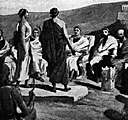Ar·e·op·a·gite
(ăr′ē-ŏp′ə-jīt′, -gīt′)n.
A member of the council of the Areopagus.
Ar′e·op·a·git′ic (-jĭt′ĭk, -gīt′-) adj.
American Heritage® Dictionary of the English Language, Fifth Edition. Copyright © 2016 by Houghton Mifflin Harcourt Publishing Company. Published by Houghton Mifflin Harcourt Publishing Company. All rights reserved.
Areopagite
(ˌærɪˈɒpədʒaɪt)n
1. (Historical Terms) a member of the Areopagus, a judicial council of ancient Athens that met on the hill of that name
2. (Law) a member of the Areopagus, a judicial council of ancient Athens that met on the hill of that name
Collins English Dictionary – Complete and Unabridged, 12th Edition 2014 © HarperCollins Publishers 1991, 1994, 1998, 2000, 2003, 2006, 2007, 2009, 2011, 2014
Ar•e•op•a•gite
(ˌær iˈɒp əˌdʒaɪt, -ˌgaɪt)n.
a member of the council of the Areopagus in ancient Athens.
[< Latin Arēopagītēs < Greek Areiopagitēs; see -ite1]
Ar`e•op`a•git′ic (-ˈdʒɪt ɪk) adj.
Random House Kernerman Webster's College Dictionary, © 2010 K Dictionaries Ltd. Copyright 2005, 1997, 1991 by Random House, Inc. All rights reserved.
ThesaurusAntonymsRelated WordsSynonymsLegend:
| Noun | 1. |  Areopagite - a member of the council of the Areopagus Areopagite - a member of the council of the AreopagusAreopagus - the highest governmental assembly in ancient Athens (later a judicial court) fellow member, member - one of the persons who compose a social group (especially individuals who have joined and participate in a group organization); "only members will be admitted"; "a member of the faculty"; "she was introduced to all the members of his family" |
Based on WordNet 3.0, Farlex clipart collection. © 2003-2012 Princeton University, Farlex Inc.